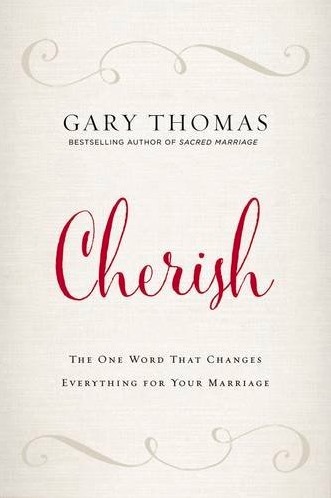Gary L. Thomas's Blog, page 60
November 22, 2016
Feed Your Marriage

Many of us (at least in the U.S.) are making all sorts of plans about how to feed ourselves and our family on Thanksgiving Day. Let’s pause to consider how we can feed our marriage. But first, let me set this up.
Do you remember the time your baby had a sopping wet diaper? Let’s say it was a particularly messy one, so you got everything all over your hands, but after you got your child cleaned up and she was wearing a fresh soft diaper, she looked you in the eyes and said, with the cutest voice imaginable, “Thank you.”
No?
That never happened?
Huh.
Perhaps you remember holding your sick baby for hours while colic gripped his stomach? Finally, after five hours of non-stop holding, pacing, and rocking, you put your nearly asleep baby down and he looked up at you with a smile and said, “Thank you so much! You’re the best mom/dad in the whole wide world.”
No? That didn’t happen either?
What? Your baby actually cried when you put him down, even though you had been holding him for so long?
How do I know this? We had three of them! Babies are all demands. Babies and gratitude are like scuba diving and the desert—they never go together. But we don’t expect them to. Babies aren’t formed morally. They are immature. They are takers, not givers.
It’s one thing when this is true of a baby; it’s particularly sad when it’s true of an adult.
Do we take, take, take from our spouse, without ever saying thanks? Do we receive their support, their encouragement, their good humor, their affection as an expected fact of life but then get enraged when they have one bad day or forget to do one thing we asked of them?
Many of us do.
And when we do, we’re acting like babies. We have the character of a six-month-old child.
In a wonderful sermon entitled “Perpetual Thanksgiving” (which inspired this blog post), twentieth century preacher Clovis Chappell said, “Gratitude is a child that we must watch and train and develop. Gratitude must be cultivated. It must be tended and watered and watched over or it will die.”
This is true in marriage as well.
Thankfulness toward our spouse—expressed and thought about and offered back to God—is like watering your plants or feeding your lawn. One of our first summers in Houston, our lawn care knowledge was a bit lacking. We eventually woke up to a brown wasteland, with all kinds of weeds growing up. It was embarrassing to walk by. Our lawn guy spread some weed and feed on there and two weeks later our lawn rivaled any other lawn in the neighborhood.
Your marriage can be that dry and even dying. It can look malnourished and brown instead of a lush green. Feed it with thanksgiving. “Whatever is pleasing, whatever is commendable, if there is any excellence and if there is anything worthy of praise, think about these things.” (Philip. 4:8)
Let’s not be babies in marriage—taking everything for granted and screaming loudly when it stops, never being thankful, but always punishing our spouse with silence or surliness if one thing doesn’t go our way. Too often we take for granted every blessing, but then resent every little thing that is missed. In such a marriage, your spouse can only displease you—they can never thrill you, because you have become incapable of being pleased. If it is positive, you take it for granted. If it is negative, it is all you can think about. Thus, you can only be disappointed, never satisfied—just like a baby.
So many marital issues could be solved if we would just do what the Bible tells us to do: “In everything, give thanks.” (1 Thess. 5:18) Chappell’s comment that this never happens by accident that this attitude never just grows on its own, is worth heeding, so I’m going to repeat his words: “Gratitude is a child that we must watch and train and develop. Gratitude must be cultivated. It must be tended and watered and watched over or it will die.”
Think of five things you are grateful for about your spouse. Thank God for these qualities and as soon as you can, mention them to your spouse. With this one simple practice, you can begin feeding your marriage right now.
The post Feed Your Marriage appeared first on Gary Thomas.
November 17, 2016
Post Election “Healing”
 We’ve all heard the calls to “unite” and “heal” following one of the most contentious presidential elections in modern history. I’m not calling marching, protesting, and posting on Facebook inappropriate, but it hasn’t been all that effective in bringing us “together,” has it?
We’ve all heard the calls to “unite” and “heal” following one of the most contentious presidential elections in modern history. I’m not calling marching, protesting, and posting on Facebook inappropriate, but it hasn’t been all that effective in bringing us “together,” has it?
How about we try something different; what if we decide to make this Christmas a little extra special for one particular family? What if people who voted in one of three ways decided to follow up their vote by making Christmas special for specific families?
Those who voted for Hillary Clinton and are appalled by the things Donald Trump said during the campaign and feel genuinely frightened about the future and the implications of this election can “adopt” certain families for Christmas and say, “You might feel threatened or ignored by the future government, but you’re still cared for by God’s people. We want you to feel noticed and loved.” Perhaps you can find a family that fits the demographic that you believe is most threatened or afraid.
Those who voted for Donald Trump and are tired of having their vote characterized as one of hate when they truly thought their vote would create a better country can go from the macro to the micro and say, “We’ve never been motivated by hate and in fact love everyone in this country, and we love you, and we’re demonstrating this love by helping to give you a special Christmas.”
Those who believed they couldn’t vote for either major candidate can say, “We couldn’t vote for Clinton or Trump, but we can vote for you this Christmas. Here’s a gift in Jesus’ name.”
Lisa and I have tried to be very focused this Christmas season. We know of a small ministry that provides Christmas gifts to children whose moms have recently fled domestic violence. Because of our call to bless marriages, we want to make Christmas special for those families whose marriages have broken apart due to violence. We don’t want Christmas gifts to be another casualty of divorce.
Because the economy has been so bad (we’ve just gone through the first 8 year stretch in American history when the GDP never reached 3% growth in a single year), as a pastor I’ve dealt with a lot of unemployed people and have seen the toll this takes on marriages, so we’re also giving a little something to a family hit hard by long-term unemployment.
And because Lisa and I remember the “sting” of Christmas when a commitment to ministry makes the budget extra tight, we always look for a family involved in ministry that would be blessed, just a bit, by adding to their Christmas budget.
Added to that is the work Second Baptist does through its “Angels of Light” ministry–bringing in thousands of kids and giving away thousands of gifts, meals, and clothes to those from under-privileged backgrounds. We’ll be participating in that, as well.
None of this will be done in the name of Hillary Clinton, Donald Trump, or as a protest, but as an act of love in the name of Jesus Christ.
If someone cares to fault the way we voted (neither Lisa nor I have or will make our vote public because that’s the policy of the church I’m on staff with), we can have the quiet satisfaction that we did more than vote—we tried to make a real difference in several families’ Christmases. Some may question our politics, but can they question our heart for reaching the victims of domestic violence, the unemployed, ministry folks who may be underpaid, and under-privileged families from the inner city?
Faith without works is dead, but in a sense, so are votes without works. Our civic responsibility—and even more important, our Christian responsibility—doesn’t end at the ballot box. We’re called to look after the orphan and widow in their distress (James 1:27).
Instead of fighting with your relatives over Thanksgiving you can say, “How about we agree on this: let’s all adopt a family for Christmas that has been hurt by the current administration (if that’s your belief) or will likely be hurt by the future administration (if that’s your belief)” and leave it at that?
How many families do you think this blog community could reach?
Would you prayerfully consider finding one or more families that fit a demographic for whom you have a special concern this Christmas? Will you let us know how many you’ve decided to bless? You could reply, “We’ve got one,” or “We’ll reach three.” If you want it to remain anonymous, you can email us at alli@garythomas.com and just say, “Put us down for five” (or whatever number you choose). We’ll provide a running count.
Wouldn’t it be special if a people who love Jesus and love families and love marriage want to support real families this Christmas with a special blessing? We’re not telling you where to give or how—and please, don’t send anything here! This should go directly to a family. It may not be (and for us often isn’t) tax-deductible, but that’s not why you’re giving. You want to celebrate Jesus’ birth by making another family’s celebration extra special.
Please, let us know what you decide. We’ll keep you updated on how many decide to join this effort. This is a small act, it’ll never be written about, but together, in a quiet way, we can do just a little bit to bring actual healing to a fractured country by pointing people back to the birth of our Lord and Savior Jesus Christ.
FAMILIES TO BE BLESSED: 8
The post Post Election “Healing” appeared first on Gary Thomas.
November 10, 2016
Singles: If He Won’t Change to Get You, He Won’t Change to Keep You

I’ve found men are most motivated to change during two times in a romantic relationship:
Prior to the wedding (to get the woman to agree to marry them) and
When a wife files for divorce.
Those are the easiest times to get a man to reconsider and reform long-standing bad habits.
If you’re single, you don’t want to ever imagine the second scenario—it’s a nightmare to play the divorce card to get your husband to listen and I’m certainly not recommending it. The first scenario, however, is one that single women (and men, in the same way) need to take very seriously.
Let me put it like this:
Women, if he won’t change to get you, he won’t change to keep you.
If there’s something in your romantic partner’s life that really bugs you—he’s drinking too much, he has a worrisome temper, excessive spending, porn use, he’s lukewarm about church, etc., and it comes up in premarital counseling but still doesn’t change, it won’t change after you’re married.
During engagement, you’re with a man when he is most motivated to change. If he figures out he has a “pass” while you’re engaged, he will reasonably assume he’ll also have a pass in marriage. While it’s embarrassing and expensive to call off an engagement, it’s devastating to go through a divorce. If you didn’t take the first option (calling off the wedding), you’re likely to put up with even more before pursuing the second (filing for divorce).
If you want him to be more serious about his earning potential; if you want him to be the one encouraging the two of you to go to church (instead of you having to remind him), bring it up and see what he does. If the answer is nothing or very little, then you can be reasonably certain he’s not going to be any more motivated to address his job situation after marriage. In fact, he’ll probably be less so. He won’t take a sudden interest in church, either. In fact, he’s far more likely to attend less.
My friend, marriage and family therapist Dr. Steve Wilke, reminds me of a key principle: the best predictor of future behavior is past behavior. If a man isn’t motivated enough by the thought that you might not marry him if he acts out, he won’t be motivated enough by the thought that you might divorce him if he acts out. Most Christian women don’t want to even mention the word divorce, and biblically, there are very few scenarios where, in good conscience, they can even pursue that option.
Please understand: motivation is so important in marriage. Husband A carries on controlling behavior for a decade, by his own admission, until his wife files for divorce. He changes almost immediately. Husband B has 101 reasons why he can’t “yet” find a job, and after 12 years of this ongoing behavior, the wife files for divorce. Husband B has a new job within 30 days of his wife filing.
These aren’t coincidences.
It’s all about motivation.
And if your guy isn’t motivated to please you as a fiancé, he won’t be motivated to please you as a husband.
The most frustrating circumstances for me in pastoral counseling are when one spouse is obviously distraught over his/her spouse’s behavior, and the other spouse seems mildly apathetic, at best. How someone can be unmoved by a spouse who feels like she is drowning is beyond me but it’s not all that uncommon.
Marry a man (and men, marry a woman) who will be motivated to change out of reverence for God and empathy for you. Something may not be forbidden by God, but if it hurts my wife, that’s all the reason I need to let it go. How can I love my wife if I’m hurting her?
Engagement is the time to test your potential spouse’s motivation. Bring up the issue. Make sure he/she knows it really matters to you. If that’s not enough to send them (on their own initiative) to a counselor, a recovery group, or to stop entirely on the spot (if it’s the kind of behavior that can be stopped), then you have two choices: go ahead and get married, essentially agreeing to live with this character defect for the rest of your life, or find someone else who loves you enough to address character issues that cause you pain.
I recommend you seriously consider the latter option.
The post Singles: If He Won’t Change to Get You, He Won’t Change to Keep You appeared first on Gary Thomas.
November 4, 2016
Cherish
“My dove, my perfect one, is the only one.” Song of Songs 6:9 Marriage becomes particularly special when this verse describes how we view our spouse.
Just this morning as I was in my study, I heard my wife gradually waking up. My heart went out to her. I hadn’t seen her yet, but just knowing she was moving and awake flooded my soul with new affection.
For the past several years, I have sought and prayed for a cherishing heart toward my wife, and God has answered that prayer. Millions of couples have pledged, on their wedding day, “To love and to cherish until death do us part,” but virtually every marriage book focuses almost exclusively on love. What does it mean to cherish? Why is it a part of the wedding vows? Does it even matter?
Aspiring after a cherishing marriage has opened up new realms for Lisa and me in our 31st year of marriage. It has drawn us closer. It has made our relationship and thus our home that much more pleasant. There’s a certain sense of delight when you truly cherish someone you live with and come home to every day. If you cherish your spouse, it’s a treat just to see them—or to hear that they are awake.
After striving to grow in cherishing my spouse, and after making sure it was something that could be both developed and practiced, I spent two years writing about it. Especially if you’re a believer, you can choose to grow and build a cherishing marriage. It’s what your spouse wants. It’s what you want.
One way to distinguish “cherish” from “love” is to consider the ballet. A ballerina has to be strong, athletic, and have endurance. The moves are physically demanding. But that’s similar to an NFL linebacker, who also must be strong, athletic and have endurance. What sets the ballerina apart is the grace, the beauty, the poetry. Love is the athletic strength of marriage—unquestionably the supporting spiritual mechanism of any union. Cherish is the grace, the poetry, and the beauty of enjoyment. It takes your marriage to another place and makes it not only beautiful to dance, but beautiful to watch.
I wrote Cherish: The One Word that Changes Everything for Your Marriage in response to a call. I believe God wants to raise the level of Christian marriages beyond merely sticking it out, sacrificing, or persevering. These are all important and wonderful things, but I believe He also wants to set in motion delighted relationships that speak of His passionate joy. The Heavenly Father who cherished Jerusalem and the Son who cherishes the church wants to teach us to cherish our spouse.
You can learn to do this. You can help your partner learn to cherish you. You can raise the level of your marriage by making cherish the new destination.
Zondervan is making it very easy for you to give this book a shot. By pre-ordering a copy now, you receive not only the hardback book when it’s available in January, but right now you’ll get a free digital download of my prior book Devotions for a Sacred Marriage. You’ll also get, immediately, a digital download of the first three chapters of Cherish. Added to that is a podcast, previously unreleased, in which Lisa and I talk about what it means to build a cherishing marriage.
Some of you have noticed that there is no place available to donate to this ministry, either on my website or blog. We don’t accept donations—we want you to support your local church. But if this marriage ministry has touched you, one of the best ways you can support what we do is to pre-order a copy of Cherish for yourself, your spouse, and another couple. Pre-orders are so important in this crowded world of publishing, and I will consider it a personal favor if you would take the time to reserve your copy (or copies) of Cherish today.
Early readers have told me that the book delivers on its promise, and I certainly pray that this is true. I want to see your marriage blessed with a new vision, a new understanding, and a new goal—a marriage that goes far beyond merely staying together, to one that pursues the blessed element called cherish.
PRE-ORDER HERE!…http://www.garythomas.com/cherish/
The post Cherish appeared first on Gary Thomas.
November 1, 2016
River People

You can divide the world into two different kinds of people: “river people” and “lake people.” You will be most fulfilled, and your marriage will be happiest, when you learn to become one of the river people.
One of the things I love about marriage is that it helps us become the very kind of people God created us to be: “river people” rather than “lake people.”
Becoming a “river” person (we’ll define this in just a moment) is a theme that runs through all of Scripture, but let’s begin by setting it within a huge announcement Jesus made early in his ministry:
“On the last and greatest day of the festival, Jesus stood and said in a loud voice, ‘Let anyone who is thirsty come to me and drink. Whoever believes in me as Scripture has said, rivers of living water will flow from within them.’ By this he meant the Spirit, whom those who believed in him were later to receive.” John 7:37-39
The words of Jesus about streams of living water refer to a prophecy in Ezekiel chapter 47. It’s a stunning picture:
47 The man brought me back to the entrance to the temple, and I saw water coming out from under the threshold of the temple toward the east… The water was coming down from under the south side of the temple, south of the altar …It was deep enough to swim in, a river that could no one could cross… 7 When I arrived there, I saw a great number of trees on each side of the river. 8 He said to me, “This water flows toward the eastern region and goes down to the Arabah, where it enters the Dead Sea. When it empties into the sea, the salty water there becomes fresh. 9 Swarms of living creatures will live wherever the river flows. There will be large numbers of fish, because this water flows there and makes the saltwater fresh; so where the river flows, everything will live… (12) Fruit trees of all kinds will grow on both banks of the river. Their leaves will not wither, nor will their fruit fail. Every month they will bear fruit, because the water from the sanctuary flows to them. Then their fruit will serve for food, and their leaves for healing.”
The new temple that God promises to rebuild will have a river of living water flowing out of it. It will produce food and even be a source of healing. It won’t be a stagnant body of water—a lake that simply serves those right around the temple. On the contrary, streams of living water—a river—will flow out of Jerusalem into the surrounding desert.
We sometimes forget that the Bible was written in a land surrounded by the desert. Rivers and water are symbols of God’s grace that brings life and refreshment. You could have a barren wasteland that, once it is irrigated, springs forth in glorious vegetation. Many of you have played on some amazing golf courses in California and Nevada that, absent water, would soon resemble the barren landscape that surrounds them.
Jesus is proclaiming what his church, his people will be like: river people. With God’s Spirit flowing out of us, into the desert of unbelief, God irrigates the world. Christianity isn’t about God making our life a little easier or slightly more comfortable—saving us so that we can enjoy an ideal little lake house safely sheltered from the rest of the world while we wait to go to heaven. It’s about us being committed to consistently turn away from ourselves and make sacrifices on behalf of God’s Kingdom:
We are called to become channels of God’s living water flowing freely through us to refresh others.
We weren’t created to be stinking, mosquito-infested lakes. We’re called to be rivers of life. And learning to cherish our spouse turns us into the kind of people who learn to submit and surrender to God so that his Spirit flows through us without limit. With God as our source, we don’t expect the desert to irrigate the river. The river never says to the desert, “Hey, when are you going to start doing something for me?” The river spills into the desert and brings life wherever it goes.
What if the challenge of learning to cherish our spouse, even an imperfect spouse, is one of God’s ways of shaping us into river people who give, instead of lake people who simply demand and take it all in?
If we truly want to be like Jesus, like so many of us say we do, we can’t forget that he said “It is better to give than to receive.” Jesus also said the Son of Man came not to be served, but to serve. In Genesis 12, Abraham was told he was being blessed so that he could be a blessing. And Israel’s call as a nation was to receive God’s favor so that his favor could one day spill out as a light to the Gentiles.
You can’t find a “lake” mentality in the Bible—taking all the water in, letting nothing out. It just doesn’t exist.
It’s all about being a river.
When the river stops flowing, the city dies.
At its height of power and influence, Rome boasted one million citizens. By the 12th century, it was down to 20,000.
From one million to 20,000. That’s an astonishing fall.
Volumes have been written about what happened, but the reality is rather simple: the barbarians destroyed Rome by destroying the aqueducts. Most cities in the centuries prior to and after the first century were decimated by the plague, but Rome escaped the worst of this disease because it had plentiful water running through the aqueducts. By taking out the aqueducts, the barbarians effectively made Rome a miserable place to live.
When you don’t have fresh water running through your heart and marriage out into the desert; when your life isn’t “We love because he first loved us” (1 John 4:19) but is rather, “When are you going to irrigate my desert?” then you’ll live with contempt. Your marriage, like Rome with its stopped-up aqueducts, will become a miserable place to live. You were created to be a river, letting God’s Spirit flow through you into the desert, not a lake.
Learning to cherish your spouse is learning to be a flowing river. A river is active, constantly moving, receiving from God and letting out to others. So the call to cherish our spouse is a call to become what God created us to be: it trains us to view ourselves as river people, not as lake people.
Receive from God—every day, multiple times a day. Be blessed by Him so that you can be a blessing to others, beginning with your spouse. Then, together with your spouse, be a river of blessing to your community.
Don’t curse a desert for being a desert. What else could it be? Instead, be a channel for the river of life to make that desert (a spouse, a friend, a community) come alive.
The post River People appeared first on Gary Thomas.
October 25, 2016
Marriage in a Bikini

Lisa and I love watching the Olympics, and this summer there were several sports in which we caught just about every event. One of them was beach volleyball. During a crucial game, one of the U.S. women’s teams had a rough go. A seasoned veteran wasn’t having her best day, and the opposing team kept targeting her, directing most of their attacks her way. The U.S. team lost that match.
To her credit, this player took full responsibility and said she just had to start playing better (which she did in the next match; they went on to win the bronze medal).
Marriage is kind of like beach volleyball—marriage in a bikini. There are two players per side, and the team (or marriage) can be only as strong as the weakest individual. If one partner has a persistent weakness, the marriage will suffer accordingly.
In Frank Shorter’s autobiography My Marathon, Frank shares how at any given elite marathon there are only about ten runners who are physically capable of winning. The 1972 Olympic men’s marathon was delayed a day due to the terrorist attacks on the Olympic village. The marathoner who had the fastest time in the world that year was having lunch with Frank and complained that it just wasn’t fair—their training was carefully calibrated, and pushing the race to a different day would mess everything up.
Frank was far more laid back, responding, hey, we’ve been training for this race our entire lives. One day isn’t going to make any difference. He added (to the reader, not this runner), that he knew this guy—even though he had the fastest time in the world that year—wasn’t going to win the gold medal. He had already talked himself off the podium before the race even started.
As I read this account to Lisa, she said, “That’s you!”
“I know!” I responded. “But I want to become more like Frank Shorter.”
My marriage will improve when I learn to roll with the changes, not obsess over things I can’t control, and refuse to think the worst when unexpected interruptions occur. As long as I allow myself to be obsessive in a negative way, that’s where Satan will attack our marriage as well as my joy, peace, and confidence.
If you want to improve your marriage, think about that personality trait of yours that isn’t what you wish it would be. If you don’t address it, that’s where your marriage will suffer. Remember—you’re like a beach volleyball team. If your spouse is responsible financially but you aren’t, your spending may still overwhelm your spouse’s discretion. If you are Eeyore and your spouse is Tigger, your marriage will suffer the effects of your negativity. Once you get married, you no longer stand alone—everything you are and aren’t will impact your marriage, either positively or negatively.
Some of you are thinking, “Then I’m doomed, because my spouse is really weak in this or that area.” That’s arrogant, and it’s not helpful! The volleyball player’s teammate didn’t play a perfect game, but she didn’t point that out—she focused on what she needed to do to improve, which is all any of us can control.
One of the best gifts you can give to your marriage and to your spouse is a commitment to keep growing in the Lord. If you cling to romantic sentimentality (“Why can’t he love me just the way I am?”), you’re preferring spiritual laziness over the health of your marriage and over the desire to bless your spouse. I have the opportunity give my wife a gift—a better, more mature me—but not if I’m too selfish or too lazy and instead just want her to keep stepping around the moral obstacles I drop in her way.
In his Word and by His Spirit, God has made available to us everything we need to grow: “His divine power has given us everything we need for a godly life through our knowledge of him who called us by his own glory and goodness. Through these he has given us his very great and precious promises, so that through them you may participate in the divine nature, having escaped the corruption in the world caused by evil desires.” 2 Peter 1:3
Which means not growing is a choice. If we want to grow, we can. God has made growth available to every believer.
Where do you need to grow? Where is your marriage threatened by a personal weakness? Start addressing those areas where you are weakest. Remember, you’re a two-man team. Your spouse has put a large amount of faith in who you are and who you become. Do everything you can to honor that commitment.
If you want to read further on this, I’d like to suggest two books. My book, The Glorious Pursuit (1998, NavPress), talks about the ancient path of growth via practicing the virtues. It’s a practical primer on how to replace vices with virtues. A more comprehensive and academic approach to spiritual growth can be found in N.T. Wright’s After You Believe. Many have told me that Wright’s book was somewhat difficult to get through, but it’s worth the effort—his insights are far superior to mine if you’re willing to do the work to mine them.
The post Marriage in a Bikini appeared first on Gary Thomas.
October 17, 2016
You Need What You Don’t Want

What if one of the things we need is something we don’t want?
One of the things I love about marriage is that it can lead us to places where we will be all but forced to rely on God like we never have before.
My friend Rett gulped deeply when the doctor told him that his wife Kristy had to have a particular operation that could keep her in bed for several days and require special care for a few weeks after that.
Rett is a cognitive man, a brilliant lawyer, but he tends to live in his head with concepts and arguments and a quick wit. He makes a good living and can hire people to do what he doesn’t want to do. He’s not used to playing the role of a nurse, which is what he knew he would have to be doing for his wife.
On the way home from the doctor’s office, Rett blurted out, “I don’t know if I can do this!”
“What do you mean?” Kristy asked. “I’m the one getting the operation!”
“I mean, I don’t know if I can be that low maintenance. I’m high maintenance. Tank (their dog) is high maintenance. The only reason our marriage works is because you’re low maintenance and you hold everything together.”
Marriage is a long journey—long enough so that eventually even the lower maintenance spouse is going to be at least temporarily high maintenance. While many might see this as a curse to bear, this actually can be seen as a gift if the normally higher maintenance spouse views such seasons as opportunities to step up and switch seats, becoming the primary caregiver, perhaps even becoming a different kind of person.
Ruts are comfortable, but limiting. They stifle personal and spiritual growth. Marriage sometimes forces us out of those ruts so that we are invited to grow in areas in which we may not want to grow, but in which God is eager for us to grow.
In case you’re wondering, Kristy gave Rett a glowing report about stepping up, though she admitted he was rather relieved when one of her relatives finally flew into town and took over.
Here’s the key: marriage presented Rett with a situation he would never have chosen on his own. Rett didn’t choose marriage to learn how to become a nurse—part of his attraction to Kristy was the fact that she was so low maintenance—but that’s what he had to do now that he was a husband. Marriage called him to step up outside of himself, depend on Christ, and in the process become more like Christ.
Rett followed and appreciated Christ the teacher, but Jesus wasn’t just a teacher. Christ touched the lepers, healed a woman who had been bleeding for years, and regularly made time out of His schedule to attend to the physical needs of those He loved. To put it in language Rett can now understand: Christ on earth wasn’t just cognitive; He was also caring. For Rett to become more like Christ, he had to grow in the same area. He’s got the cognitive down—you’re not going to trick him with false doctrine—but can he learn to care?
Ask yourself, what if marriage is supposed to be difficult on occasion so that we are forced to learn to rely on God’s Holy Spirit and become a different kind of person?
What if God is more concerned about our “practical atheism”—saying we believe in Him but rarely relying on Him—than He is about how easy our marriage might be at any given moment?
What if half of our frustration in marriage results from the fact that we want it to be easier but God wants us to become more mature?
Consider what your marriage may be calling you to today that you don’t feel capable of doing on your own. Instead of saying, “This is just too hard” or “This just isn’t my gifting or calling,” or “that’s not why I got married,” invite God to transform you into a different kind of person.
Be bold; hold God to His word: “Lord, You promise to give the weary strength. I am bone weary. You promise to give power to one who lacks it. I feel powerless. You promise to give the ignorant wisdom. I am clueless about what to do.”
Instead of running from the difficulties of marriage, let’s allow them to teach us the glory of spiritual dependence on God. Let’s accept the invitation to become a different kind of person. It may not be what we want most of our marriage, but it may, in given seasons, be what we need most from our marriage.
The post You Need What You Don’t Want appeared first on Gary Thomas.
October 11, 2016
Getting Better all the Time

Lisa and I returned home from our honeymoon and moved into a trailer in a trailer park, in the middle of nowhere. It was rent free, offered by a family friend and we had almost no money.
Lisa didn’t complain.
When we moved to go to seminary, I found a room for rent in the basement of an old house. The carpet got soaked whenever it rained hard, and this was in Bellingham, Washington, where it rains every other day and rains hard at least once a week during the winter.
Lisa had to get out of the dark basement, so we found an old apartment building where we could live on the top floor. We were “managers” (the only way we could afford it), so people knocked on our door at all hours with various complaints, including the two men who needed to go to rehab approximately every other week. The building was so old the electrical system completely blew out and it took days to rewire the building, so everybody was upset about their melting refrigerator/freezers.
We were liberated from being managers by sharing a small apartment with another married couple. The landlord thought we were crazy, saying it was too small for two couples. But both of our budgets were smaller than the inconvenience, and somehow, both couples managed to conceive our first children in that apartment.
So, for our first “house” we rented a tiny shack that had been a parsonage in 1935. The walls were so old you could literally feel the wind coming through them when it was windy (and may I remind you, this was Bellingham). Some nights, Lisa slept on the floor by the one heater with our baby daughter because the warmth only spread to about five linear feet. For those of you who have heard me preach, this was the house where the now famous Remington the Cat lived and died (or so we thought).
When we moved across the country to start a new job in Northern Virginia, Lisa put up with an apartment building for the first couple of years. I picked it out before she arrived, and didn’t think about the hassle of having the parking so far away from the front door, with steps, when you’re bringing home groceries and a toddler. And then Lisa got pregnant, almost immediately (we had been apart for five weeks, and Lisa got pregnant the first night she joined me—go figure). And then, of course, I didn’t think that when you rent an apartment right next to a major hospital you might occasionally (or not so occasionally) hear an ambulance squealing by. But it’s what we could afford.
And Lisa didn’t complain.
We then managed to buy a small townhouse a long commute away in Northern Virginia. My “office” was in our small bedroom, and with two kids (eventually three), it probably wasn’t a good idea to buy a townhouse with three levels. And the commute ended up being a problem because we didn’t have a car with air conditioning (we didn’t need it in Bellingham). Lisa brought iced towels on long trips to help the kids get through it. And never complained.
I could go on and on describing several more houses before Sacred Marriage got published, but I don’t want to lose you. Lisa put up with a lot. She bore the poverty of a ministry lifestyle without ever complaining. We did get into a heated argument when Allison was a baby and I saw her play with a chime ball in the church nursery, so I went out and bought Ally one. Lisa thought it was a ridiculous expense on a tight budget (the chime ball cost $8); Allison didn’t help my cause when she found the box more interesting than the toy. “See?!” Lisa said, and I knew she was right, and I felt humiliated that I couldn’t give my daughter something so small without it creating tension.
But Lisa didn’t complain. She never made me feel like less of a man. She never asked me to leave the ministry or stop writing in the early mornings and on weekends. If anything, she was extraordinarily grateful that we never talked about her getting a job and having to put the kids in daycare. We tried that, part-time, for about two months and were done with it forever. It didn’t fit us at all (I’m not making a judgment; I’m making a personal statement).
So, this week, when Lisa’s “home” is the Fleur de Lys, a canal cruise boat leaving Dijon France, with a crew of six for six passengers, well, I’m really happy for her.
She was grateful when a family friend offered us the mobile home to move into 30 thirty years ago, but I suspect she’s even more grateful for this gift from a different set of friends.
We’ve stayed in so many dive hotels—one with shag carpeting that Lisa was horrified to walk on. And she’s put up with so many church meals, particularly at one conference in the south, when it was fried chicken (Lisa doesn’t eat anything fried), “fruit salad” (canned fruit swimming in sugar syrup, and Lisa doesn’t eat sugar), and a “vegetable salad” with iceberg lettuce and bleu cheese dressing (“there aren’t any vegetables in that salad!” Lisa pointed out, “but about 500 calories with that dressing!”).
But you know what? She nibbled enough food at that dinner to look polite (pulling back the skin on the chicken, scraping the dressing off the lettuce) and went back to the room where she ate her nut mixture.
And never complained.
I can’t tell you how humiliated she could have made me feel, how much of a failure I might have seemed for the first twenty years of our marriage. So when Lisa gets to experience a little out-of-this-world luxury that even now we couldn’t afford, I’m so happy for her. Lisa told me, as we were packing, “We don’t need to bring a lot of Quest bars on this trip; there will be plenty of food” I felt so happy for her because she’s a foodie, and the meals on these boats are prepared by artist chefs who will cater to her healthy, gluten-free diet. The last thing she will do is go hungry.
If you’re still with me in this blog, you might wonder, “What’s the point?” And the point is this: marriage is a long journey in which it really can get better, even better than you dreamed, but sometimes it takes a whole lot longer to get better than many couples are comfortable with.
The attitude with which you move through the difficult seasons will go a long way toward helping the two of you become closer, or it will create a porcupine marriage where you can’t even talk without pushing each other away.
When Lisa and I moved back from Northern Virginia to Washington State, a lawyer told us we could easily qualify for bankruptcy. We didn’t take that option for moral reasons, but more recently we’ve been going through a Dave Ramsey class and when you have to list current non-mortgage debt ($0) and liquid cash (enough to feel comfortable) we both smiled at each other, able to appreciate it because we both knew from where we’ve come.
Some young couples may not be willing to pay the price of a couple decades of sub-standard living. I wish you young wives could learn from Lisa—I want to spend the rest of my life trying to spoil her to make up for the first twenty years. We would never romanticize financial limitations. We don’t want our children to face what we faced (visiting my parents for the weekend, who were thrilled, but feeling guilty that the reason we were visiting was partly because we were literally out of food money). But now we have the perspective to take the long picture. I’m so glad we’ve stuck together because I couldn’t have those memories with any other person. Lisa and I shared them together.
And I’m so thankful for how we shared them. Lisa has never made finances the determination of what we do (including the more recent move to Houston), and I love her all the more for it.
I’m not (of course) promising couples that if they hang in there, their finances will automatically get better and they’ll finally get to enjoy some exotic vacations (though you might). I am saying that the way you face disappointments and frustrations and limitations will go a long way toward building up your marriage. The gratitude I feel for Lisa not attacking me when I was so vulnerable to attack is expressed by my desire now to say, “Whatever you want, hon. Whatever you want.”
Lisa has let me be me (a guy who really can’t do much besides write some books and speak) and I have let Lisa be Lisa (a woman who really wanted to be home every day, all day, with her kids) and we figured out the money part second. More important than where we go on vacation is the fact that both of us want to be on vacation together.
I know that for some of you—financially, health-wise, with your kids, or personal issues—it feels really, really hard right now. Trust me—I know how hard hard can be. And I know how it adds to the frustration when you’ve been dealing with something for years and see no end in sight.
But hang in there. Marriage is a long journey. And sometimes, it really does get better, even better than you ever could have imagined. I pray for you today:
“May the Lord direct your hearts into God’s love and Christ’s perseverance.” 2 Thess. 3:5
The post Getting Better all the Time appeared first on Gary Thomas.
October 7, 2016
Bucket List Weekend

In 1972, a very skinny man named Frank Shorter entered the Olympic stadium in Munich at the end of the marathon, ready to seize the gold medal. I took one look at his arms and thought, “I could do a sport like that (not fully realizing what a phenomenal athlete Shorter was).”
It was a few more years before I started running, but when I did it took hold of me like no other sport ever has. I’m not a gifted athlete, but if you’re willing to endure the pain, you can still become a decent runner. I managed to qualify for three Boston marathons, but have never seen the front of any marathon (though in a small marathon in Idaho, I did crack the top 25, but was still way, way, way behind the winner).
I’m heavier and much slower now, but I’m about to check off a bucket list item this weekend (October 9) and wanted to share it with you. I’m running the Munich marathon, which finishes in the same stadium where Frank Shorter crossed the finish line to win his Olympic gold medal. I’m reading his recently released autobiography on the way:
This will be my fourteenth marathon, and it may be my last. It’s so difficult to train in Houston during the summer, and since I still essentially work two jobs, it’s doubly difficult to find the time and energy to do what’s necessary to run a decent time. A twenty miler in Houston in August doesn’t take just three hours; it consumes an entire day as your body tries to recover. I’m just not sure if that’s a justifiable use of my time.
So if the Munich marathon is the last one I finish, it’ll be poetic. Lisa’s planning on renting a bike and checking in now and then (the marathon isn’t a big deal in Munich—spectators are limited).
If I’m slow to respond to posts on Facebook, this blog, or Twitter, you’ll know why. Lisa asked me to leave my laptop at home on this trip—this will be the longest I’ve gone in over thirty years without writing something. But she’s shared me with my computer our entire marriage, so it’s only fair I give her these two uninterrupted weeks.
I’m not going to push the pace at all. This is a leisurely run through one of my favorite cities in the world, during my favorite season, enjoying my favorite sport, while getting occasional glimpses of my favorite person riding a bike, and ending up entering a stadium where one of my favorite athletes did something that changed my life. For me, it’ll be an act of worship.
Thank you for reading this blog, my books, and coming out to hear me talk on occasion. You all have helped create a season in my life I never could have dreamed of, for which I’m truly grateful.
Anfangen ist leicht, Beharren eine Kunst
The post Bucket List Weekend appeared first on Gary Thomas.
October 4, 2016
Taking Your Marriage Beyond Happiness and Straight to Wonder

This blog spends plenty of time helping spouses deal with disappointment and difficult marriages. In this post, however, I want to encourage couples who are happy in their relationship and delighted with each other by providing a “trick” to further increase that love and happiness.
Happy couples get far too little attention in blogs and books, perhaps because happiness doesn’t sound as dramatic as misery, nor do happy couples run to blogs hoping to find a “solution.” Happy couples are delighted with the status quo! If you’re frustrated in your marriage, you can still benefit by reading about happy couples by seeing the promise and the hope.
Happy couples can do more than just enjoy each other—with the right mindset, their happy marriages can help them worship with a new intensity.
Oliver Cromwell, famed seventeenth century English leader, wrote to his recently married daughter Bridget, explaining to her how being deeply in love with your spouse can, when correctly considered, help you fall even more deeply in love with Christ: “Dear heart, let not thy love for thy spouse in any way cool thy desire for Christ. That which is most lovable in thy spouse is the image of Christ in him. Look to this and love it most and everything else for this.”
When I behold the kindness of my wife, I should reflect that she is expressing the kindness of Christ. When I see Lisa’s desire for the truth—her faithfulness in studying the Bible, her earnest questions to me at times about various theological issues, her willingness to listen to podcast sermons with me—I can praise God for giving her such a desire for truth. Truth is one of the most beautiful of all God’s creations, yet many people hate the truth. The fact that my wife loves the truth and seeks it out is a testimony to God’s mercy and goodness within her.
A Christian worldview teaches us that the best parts of our spouse are reflections of the divine image and a testimony to the presence of the Holy Spirit in their life. Every good and perfect gift comes from the Father of lights (James 1:17) and that’s especially true of the gift of character.
So, when you’re pleased with your spouse, let that pleasure grow even deeper into worship. Admiration for your spouse should become worship of God.
So many married people are seemingly astonished when their spouses fall: “How could my husband do that?’ “Why would my wife act that way?” If we accept the teaching of Scripture that tells us we all stumble in many ways (James 3:2), we should rather be astonished that a spouse displays moral excellence and take time to notice the work of God from which we benefit. Don’t take this for granted! I should take the time to truly consider my wife and marvel at the inner beauty God has planted within her.
When Lisa and I were in Florence together, we both wanted to see Michelangelo’s David. Florence has two other David replicas in other parts of the city that we had already seen, and of course we had seen photos of the famous sculpture  more times than we could count. So part of me thought, what’s the big deal? We were there in a non-touristy season, however, so there weren’t any lines (during the height of tourist season, you may have to wait for hours). Given the easy access, we couldn’t imagine leaving Florence without visiting the Academia Gallery to see David firsthand.
more times than we could count. So part of me thought, what’s the big deal? We were there in a non-touristy season, however, so there weren’t any lines (during the height of tourist season, you may have to wait for hours). Given the easy access, we couldn’t imagine leaving Florence without visiting the Academia Gallery to see David firsthand.
To my shame, for the reasons explained above, my expectations were rather pedestrian. However, when we turned the corner in the gallery and saw the David sculpture standing at the end of the hall, it felt like a religious experience. Getting up close and seeing the grandeur and the artistic genius was a once-in-a-lifetime experience. We took our time, walking around, getting up close, stepping back, looking at a few close-ups again, then walking away to see it from a distance or from another perspective.
Just as the majesty of the David sculpture demands attention and focus and adoration—one would have to be intellectually and morally stupid to not see it or appreciate it—so the beauty of Christ in my wife demands worship and awe. I need to take the time to reflect on His excellence within her, His creative and redemptive powers that have taken a once little girl who gave her life to him, who navigated through the moral minefield of an American junior high and high school, who chose to devote herself to worship and study in college, and who has continued to seek truth and godliness through three decades of marriage to such an extent that when I spend time with her, I’m reminded of Him. That’s such a beautiful, wonderful thing.
When you spend two decades in marriage ministry, you read and hear of spouses doing a lot of heinous things. I have seen un-Christlike attitudes expressed even in comments on this blog that make me shudder and remind me how blessed I am to be married to a wife who champions grace.
Training my mind to be reminded of Jesus by Lisa makes the notion of divorce unthinkable. Leaving her would be like leaving an aspect of Him, in the sense that He is so present in her life and has so marked her life that I can’t imagine not wanting to be in her presence and around this particular manifestation of His work.
This kind of reflection takes your marriage to a new dimension, beyond happiness and straight to wonder.
I hope this post will also encourage singles to consider what they are missing when they even consider marrying someone who is not surrendered to God and not inviting the Holy Spirit to transform them on a daily basis. Plenty of non-believers are kind and thoughtful, but there is a special reflection cast from the soul of one who worships. I am blessed to gaze into such a reflection every day, and like a resident who has fallen in love with a favorite pond, I can’t ever imagine wanting to move away.
P.S.
This post presents just a taste of what it means to begin creating a “cherishing” marriage. If you’d like to pre-order my next book, Cherish: The One Word That Changes Everything for Your Marriage you can do it here:
Amazon:
Christian Book Distributors:
Pre-orders are a big factor in a book’s ultimate success, so I’m very grateful to those of you who take the time to do this. You can also pre-order a copy at your favorite local bookstore.
The post Taking Your Marriage Beyond Happiness and Straight to Wonder appeared first on Gary Thomas.





